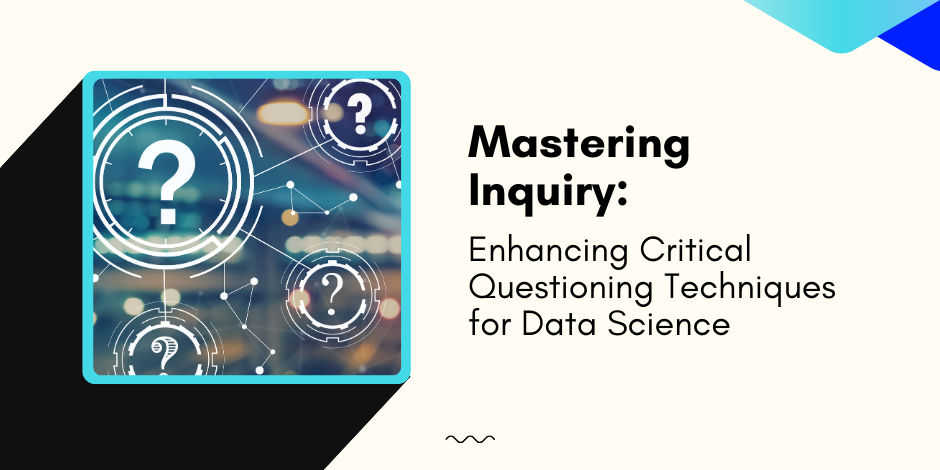Mastering Inquiry: Enhancing Critical Questioning Techniques for Data Science

Stay Informed With Our Weekly Newsletter
Receive crucial updates on the ever-evolving landscape of technology and innovation.
Asking critical questions is essential for success in all fields, especially in data science.
Effective questioning techniques help to analyse data and shape the entire data science process.
We explore the importance of inquiry in data science and provide strategies for enhancing critical questioning techniques.
Understanding the importance of inquiry in data science

Inquiry lies at the core of data science.
It drives the discovery of insights and enables data scientists to make informed decisions.
By asking the right questions, data scientists can uncover patterns, trends, and outliers that may take time to notice.
The process of inquiry helps explore new avenues and refine existing approaches.
The role of critical questioning techniques in data science
Critical questioning is a crucial component of inquiry in data science.
It involves questioning assumptions, evaluating evidence, and challenging the status quo.
Through critical questioning techniques, data scientists can identify biases, limitations, and potential errors in their analysis.
Critical questioning techniques allow for a more thorough exploration of the data and enhance the credibility of the results.
Furthermore, critical questioning serves as a compass guiding data scientists through the vast landscape of data.
It safeguards against hasty conclusions and encourages a meticulous examination of every piece of information.
By fostering a culture of critical questioning, data scientists can navigate the complexities of data analysis with precision and rigour.
How inquiry shapes the data science process
In data science, inquiry is not a one-time event but a continuous process.
It begins with formulating research questions and continues throughout the data collection, analysis, and interpretation stages.
Each process step presents an opportunity for further exploration and refinement through questioning.
By incorporating inquiry into the data science workflow, data scientists can optimise their problem-solving approach and uncover valuable insights.
Moreover, the iterative nature of inquiry in data science mirrors the scientific method, where hypotheses are tested, refined, and retested.
This cyclical process of questioning and exploration propels data scientists towards a deeper understanding of the data landscape.
With critical questioning techniques, data scientists can unlock the true potential of data-driven decision-making through this relentless pursuit of answers.
Developing your questioning techniques

Developing critical questioning techniques is crucial for data scientists to maximise the potential of their analysis.
By asking the right questions, data scientists can focus their efforts, save time, and improve the quality of their results.
Questioning is an art that requires a delicate balance of curiosity and precision.
Critical questioning techniques are not just about asking any question but about asking the right question at the right time.
Effective questioning can uncover hidden patterns, relationships, and insights within data that may not be immediately apparent.
Identifying the right questions in data science
The first step in developing critical questioning techniques is identifying the right questions.
Data scientists need to consider the goals of their analysis and the specific problem they are trying to solve.
By understanding the objectives, they can formulate questions that address the core issues and provide actionable insights.
Moreover, identifying the right questions involves a deep dive into the data’s context.
Data scientists must consider their findings’ historical background, industry trends, and potential implications.
This contextual understanding can help them frame questions that are relevant and forward-thinking.
Techniques for formulating effective questions
Formulating practical questions requires a systematic approach. Data scientists can employ brainstorming, mind mapping, and concept mapping to generate relevant questions.
They should consider the scope of the analysis, the available data, and the desired outcomes.
By formulating focused and specific questions, data scientists can avoid ambiguity and gather the necessary information for their analysis.
In addition to traditional techniques, data scientists can leverage advanced tools like natural language processing and machine learning algorithms to enhance their questioning capabilities.
These tools can help analyse vast amounts of unstructured data and generate insightful questions that may have yet to become apparent through manual methods alone.
Enhancing critical thinking skills
Critical thinking is closely intertwined with effective questioning in data science.
By cultivating critical thinking skills, data scientists can improve their ability to ask insightful questions and evaluate the validity of their findings.
The connection between critical thinking and effective questioning
Critical thinking involves analysing information, evaluating arguments, and drawing logical conclusions.
It helps data scientists assess the relevance and reliability of the data they work with.
Data scientists can ensure rigorous and well-grounded analysis by applying critical thinking skills to their questioning.
Strategies for improving critical thinking in data science
Several strategies can improve critical questioning techniques in data science.
Data scientists should actively seek diverse perspectives, challenge their assumptions, and engage in intellectual curiosity.
They can also apply techniques such as hypothesis testing, data triangulation, and peer review to strengthen the validity and robustness of their analysis.
Applying questioning techniques to data science problems
Critical questioning techniques play a pivotal role in data analysis and interpretation.
Using the right questions, data scientists can navigate complex datasets and derive meaningful insights.
Navigating data analysis with critical questions
Data analysis often involves sifting through large volumes of data to identify patterns and trends.
Data scientists can focus their analysis by asking critical questions and avoiding getting lost in the noise.
Critical questions help filter irrelevant data, identify outliers, and focus on the most relevant variables.
Using questioning techniques to drive data interpretation
Data interpretation is an integral part of data science.
By asking strategic questions, data scientists can uncover the underlying meaning behind the data.
Critical questions can help data scientists identify causal relationships, understand the implications of their findings, and explore alternative interpretations.
Data scientists can arrive at robust conclusions and make informed decisions by interrogating the data.
Overcoming challenges in critical questioning

Critical questioning in data science can be challenging due to various factors.
Data scientists can enhance their inquiry skills by understanding these obstacles and employing appropriate strategies.
Common obstacles in critical questioning for data science
One common obstacle in critical questioning is the presence of biases.
Biases can skew the questions data scientists ask and impact the interpretation of the results.
Another challenge is the availability of incomplete or inaccurate data, which may impede the formulation of meaningful questions.
Additionally, time constraints and external pressures can sometimes discourage in-depth questioning.
Solutions for enhancing inquiry in data science
To overcome these challenges, data scientists can adopt specific solutions.
They can consciously reflect on their biases and actively seek diverse perspectives.
Importantly, data scientists should strive for transparency and document their analysis process, including the questions asked and the reasoning behind them.
Organisations can foster an environment conducive to critical questioning techniques by embracing a culture of inquiry and encouraging open dialogue.
Conclusion
Mastering inquiry and enhancing critical questioning techniques are essential for data scientists to excel in their field.
Data scientists can deliver impactful insights and drive data-driven decision-making by appreciating the significance of inquiry and developing effective questioning approaches.
Want to boost your data science career? The Institute of Data’s Data Science & AI program offers a comprehensive curriculum, which can be completed full- or part-time to suit your timetable.
Join us for a supportive environment and flexible, competitive learning options.
Ready to learn more about our programs? Contact our local team for a free career consultation.





